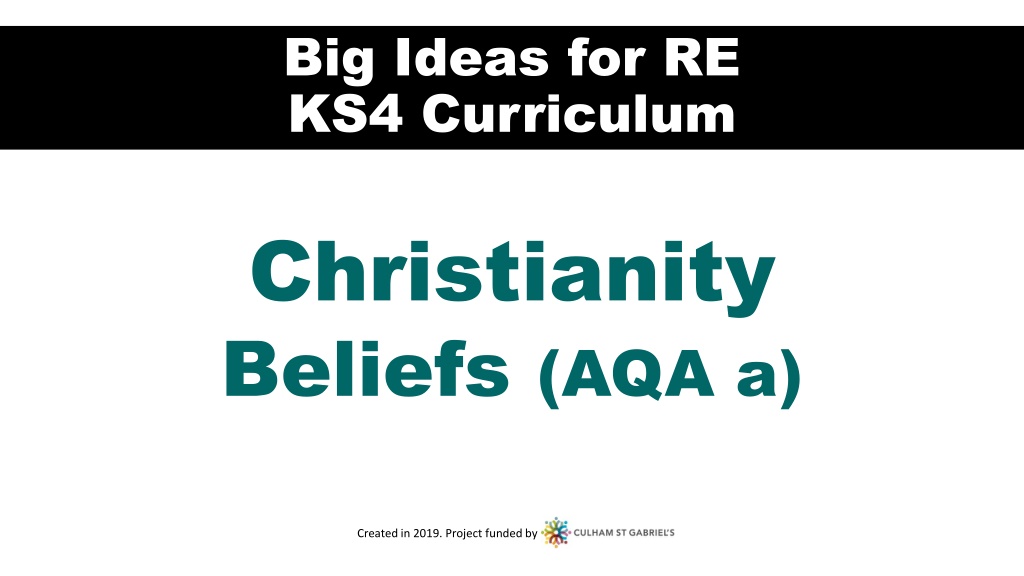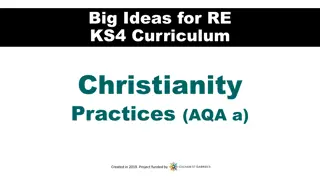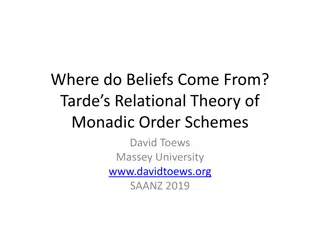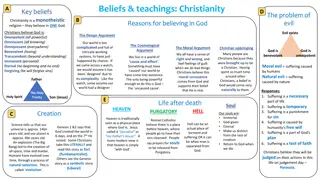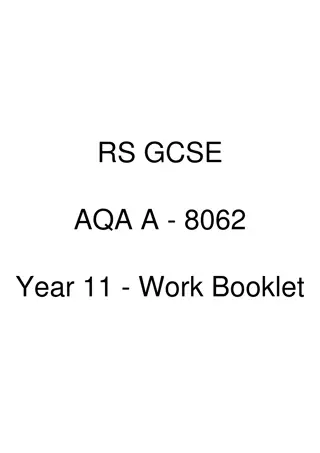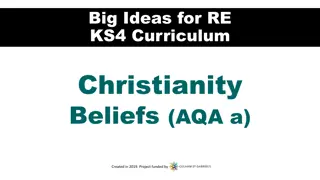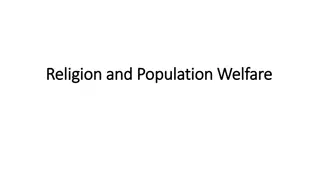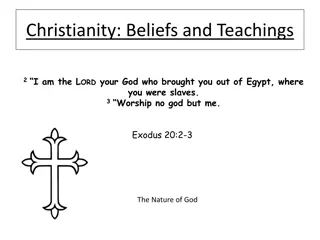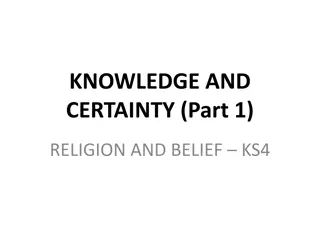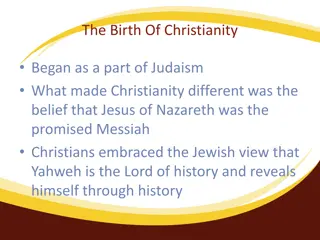Exploring Christianity: Beliefs and Key Concepts at KS4
This project delves into the foundational beliefs of Christianity, focusing on key concepts such as the nature of God, the Trinity, Jesus Christ, salvation, the afterlife, and the problem of evil. The curriculum covers diverse interpretations within Christianity, ethical dimensions, philosophical inquiries, and the historical context shaping religious beliefs. Students engage with the Nicene Creed, biblical interpretation, differing views on the afterlife, and discussions on the importance of salvation. With a focus on understanding Trinitarian beliefs and the significance of Jesus' resurrection, learners explore the depth and diversity of Christian beliefs.
Download Presentation

Please find below an Image/Link to download the presentation.
The content on the website is provided AS IS for your information and personal use only. It may not be sold, licensed, or shared on other websites without obtaining consent from the author. Download presentation by click this link. If you encounter any issues during the download, it is possible that the publisher has removed the file from their server.
E N D
Presentation Transcript
Big Ideas for RE KS4 Curriculum Christianity Beliefs (AQA a) Created in 2019. Project funded by
AQA a: CHRISTIANITY, BELIEFS AQA a: CHRISTIANITY, BELIEFS The nature of God: God as omnipotent, loving and just, and the problem of evil and suffering the oneness of God and the Trinity: Father, Son and Holy Spirit. Jesus Christ and salvation Beliefs and teachings about: the incarnation and Jesus as the Son of God the crucifixion, resurrection and ascension sin, including original sin the means of salvation, including law, grace and Spirit the role of Christ in salvation including the idea of atonement. Different Christian beliefs about creation including the role of Word and Spirit (John 1:1 3 and Genesis 1:1 3). Different Christian beliefs about the afterlife and their importance, including: resurrection and life after death; judgement, heaven and hell.
BELIEFS Religion has beliefs At the heart of each religion is a particular set of beliefs. These beliefs, some of which are shared with other religions, offer a particular vision of the universe, humanity, meaning and truth. Beliefs about the nature of reality underpin religious ritual and expression. DIVERSITY Religion is diverse Within each religion's internal landscape of belief there is variation and sometimes dissent or disagreement. Key religious concepts can be understood in diverse ways. Differences in outlook shape practice and expression. Different groups might be associated with particular times or places. CONTEXT Religious beliefs and practices have a context Every modern religion can be understood as the result of political, social, economic or existential pressures that have occurred throughout its history. Understanding such pressures can enhance understanding of the religion. The development of a religion can be seen through large-scale movements or the influence of figures and groups throughout its history; modern religious forms can be understood as contingent on these pressures and individuals. ETHICS Religion has an ethical dimension Each religion offers ethical principles regarding social, practical and spiritual matters. Some religious ethical principles apply within the logic of the religion only, while others apply to human societies more widely. Religion is one form, but not the only form, of ethical guidance. Aspects of religion can raise ethical questions, such as regarding equality and power. PHILOSOPHY Religion raises philosophical questions Each religion provides answers to questions of ultimate meaning. Religious answers to such questions are part, but not all, of the ways these questions might be answered. Some answers offered from within religion raise further questions, such as regards authority or reliability.
KS4: AQA A Christianity: Beliefs KEY QUESTION AND CONTENT 1-2: Why is Christianity called Christianity ? Nicene Creed Christian belief in the Trinity 3-4: Can the Bible be read differently within Christianity? Beliefs about creation Beliefs in God 5-6: Jesus: what s the big deal? Beliefs about the nature of Jesus Beliefs about salvation 7-8: This life or the next life: what is more important? Christian beliefs about the afterlife Differing views of the afterlife. 9-10: Does God have to be Good? The problem of evil Christian responses 11-12: Quiz/ exam Salvation is the most important Christian belief . Discuss (12) BIG IDEAS LEARNING CONTEXT: recap timeline- Jesus death and Christian beliefs about his resurrection. Info on ecumenical councils. Formulation of Nicene creed. BELIEFS: Trinitarian beliefs, that set Christianity apart from Judaism CONTEXT: brief recap about the nature of the Bible, Gen 1 and 2; what types of book, their message. DIVERSITY: different Christian interpretations of Genesis and creation BELIEFS: recap Trinity and creation, Christian beliefs about God CONTEXT: recap Jesus life and death BELIEFS: recap meaning of Jesus life and death BELIEFS: Christian salvation theology BELIEFS: recap salvation theology BELIEFS: info about Christian beliefs in the afterlife DIVERSITY: different Christian interpretations of afterlife beliefs PHILOSOPHY: problem of evil DIVERSITY: different Christian responses to problem of evil a) Recap/ revision of key words and concepts b) 12 mark question: salvation. Create as a class. Write up for HW.
